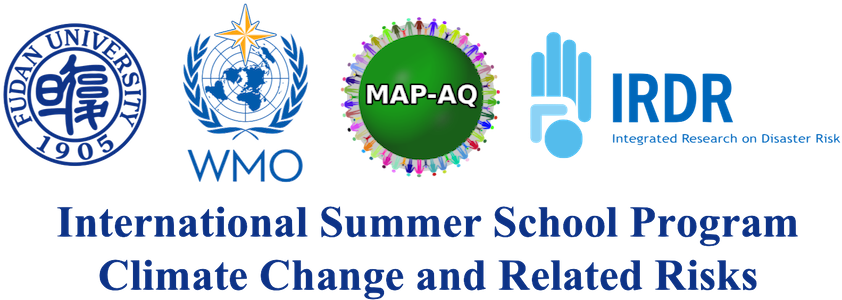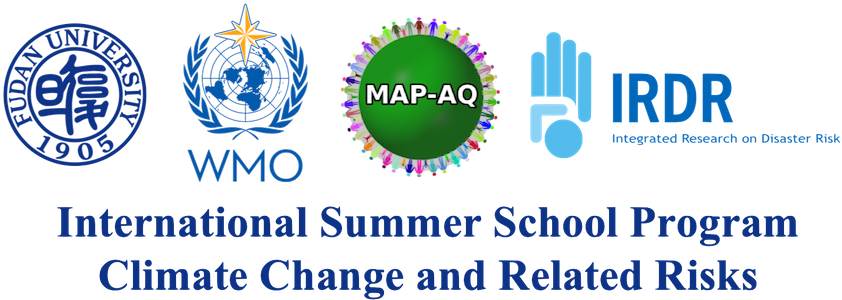International Summer School Program on Climate Change and Related Risks
Jointly Supported by FDU, WMO, MAP-AQ, IRDR
Climate change has emerged as one of the most critical challenges in the 21st century. The relentless rise in global temperatures has far-reaching implications for natural and socio-economic systems, public health, and the lives of individuals worldwide. Beyond the overall increase in temperature, climate change is also associated with a higher frequency and intensity of extreme weather events, such as heatwaves, heavy rainfall, severe storms, floods, and droughts. In the 2024 World Economic Forum Risk Report, extreme weather events ranked the 2nd global risk by severity over the short term (2 years) and the 1st global risk over the long term (10 years). The consequences of these events are particularly severe, resulting in substantial losses and damages. The impacts of climate change are far-reaching and profoundly affect various facets of our living environment. This includes not only planetary health (encompassing marine, freshwater, biodiversity, and terrestrial ecosystems) but also human society (including energy, water resources, food security, habitats, infrastructure, economy, transport, shipping, human health, tourism, well-being, culture, and population migrations). Tackling the complex, cascading, and systemic risks arising from human-induced climate change is an urgent priority for the decades ahead, demanding concerted efforts and innovative solutions to safeguard our planet and its inhabitants.
Fudan University (FDU), with the support of the World Meteorological Organization (WMO), the Monitoring, Analysis, and Prediction of Air Quality International Research Program (MAP-AQ), and the Integrated Research on Disaster Risk International Program (IRDR), has established a groundbreaking decade-long summer school program dedicated to exploring climate change and its associated risks. This event will be organized by Fudan University's Department of Atmospheric and Oceanic Sciences (AOS), the Institute of Atmospheric Sciences (IAS), the MAP-AQ Asian Office Shanghai and the IRDR International Centre of Excellence on Risk Interconnectivity and Governance on Weather/Climate Extremes Impact and Public Health (ICoE-RIG-WECEIPHE).
The summer school program is designed to serve as a multidisciplinary and global platform, bringing together students and young professionals from a wide range of fields, including natural sciences (with a focus on atmospheric and oceanic sciences), social sciences (such as economics), and interdisciplinary sciences (such as environmental science and public health). The primary objective is to cultivate the next generation of scientists and leaders in climate governance by immersing early-career researchers in state-of-the-art climate change research and fostering inclusive collaboration and holistic, integrative problem-solving approaches. Participants will benefit from a comprehensive curriculum featuring courses, lectures, and exchanges that provide insights into the latest research developments and scientific methodologies, empowering them to advance their professional growth in this crucial field. To enrich the learning experience, the organizers plan to invite 10-20 internationally renowned scholars to Fudan University in Shanghai to deliver lectures and engage in meaningful interactions with early-career scientists.
The summer school will take place annually, with each year's theme decided by a steering committee. The themes will revolve around climate change and its associated risks.
In 2024, the summer school focused on Climate Change and Air Quality. The recap video can be found at https://iss-climatechange.fudan.edu.cn/info/1008/1271.htm.



